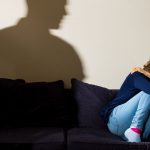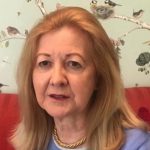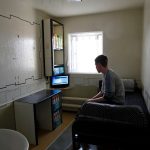What do you do in an emergency?
The first thing that probably comes to your mind is call 999.
It’s been drummed in to us all from a young age.
However, for the 12m deaf people living in the UK, it’s not that simple.
At the moment, deaf people have to rely on others, if anyone’s around, to call for help, or use a text-based system.
But today, a new 999 service is launching for the thousands of deaf people who use British Sign Language (BSL).
At the touch of a button, on an app or via PC, deaf BSL users will be connected via a video link to an interpreter, usually within five seconds.
Gatwick Airport denies staff shortages are to blame after passenger dies disembarking from plane
Heatwave: The UK’s going to be hotter than Jamaica and the Maldives today… but is it going to last?
Will the UK be whole in 70 years? Adam Boulton on the triple threat facing the Union
Through them, they can talk in real-time to the emergency services call handler – with the interpreter signing the handler’s responses and instructions back to them.
Helen Fuller, an interpreter at the BSL call centre, said it would be quicker for BSL users than the current text-based service, which can take twice as long in some cases.
That’s because for many deaf people, BSL is actually their first language, not English.
‘More independence’
Russell Cooke, Operations Manager at the 999 BSL app, explained to Sky News, via BSL: “Because deaf people use sign language as their first language they often didn’t fully understand the language they were reading.
“This enables them to use their visual language, enables them to communicate effectively and make sure that the information they’re giving and receiving is accurate.”
Not only is it faster, and more accurate, it gives deaf people more independence, Helen says.
“It is functionally equivalent to a hearing person making a 999 call.
“It’s giving deaf people the independence to make those kind of calls themselves, in a language they’re most comfortable with.
“And when you’re distressed you need to be able to communicate in your own language and not trying to communicate in a different language.”
‘I was really panicking’
The app will help people like Bryony.
Bryony Parkes is deaf, and found herself in a desperate situation when her husband went into anaphylactic shock when out on a run, in the middle of nowhere.
“I was very panicky,” she signed.
“There were no cars, there were no people. I wasn’t able to ring 999, and I thought about texting my mum to ask her to call 999, but then I thought, that’s going to take too much time.
“So I was really panicking, my husband couldn’t breathe, he was in and out of consciousness. I made the decision to drive directly to A&E, and of course during the drive was very stressed.”
Happily her husband pulled through, but she still feels traumatised.
The app “would have been a huge help. It would have allowed me direct communication, to talk about the problem, say where we were, to receive appropriate advice”, she said.
From today that will be possible. It’s a free service, funded by telecoms companies.
Not only will it spare people like Bryony the anguish of being unable to call for help, in an emergency, where every second counts, it could save lives.






















